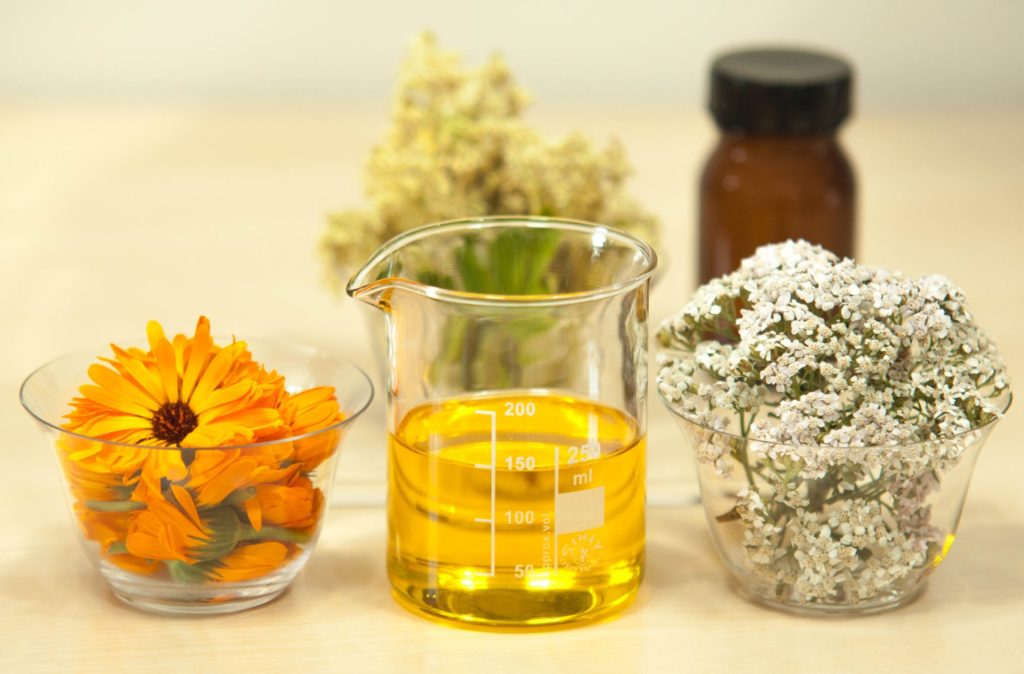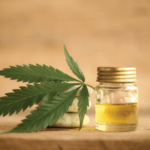Cannabidiol (CBD) is one of 113 known cannabinoids found in cannabis plants. While CBD oil as we know it has been around for over 70 years, it has recently skyrocketed in attention and popularity. Unlike THC (another cannabinoid found in cannabis plants), CBD does not cause an altered mental state and may even have huge potential for medical applications. While limited research has been done on CBD, many are hopeful that as research progresses, CBD oil will become a more readily-available treatment option for issues like epilepsy, pain management, anxiety, depression, and even cancer.

What is a Cannabinoid?
A cannabinoid is a chemical compound that acts on cannabinoid receptors in cells and alter a neurotransmitter release in the brain. Cannabinoids fall under two categories: endocannabinoids and phytocannabinoids.
Endocannabinoids
Endocannabinoids are produced naturally in our bodies and are believed to help regulate important neurological functions. The endocannabinoid system has only recently been recognized for its importance and relatively little is known about it.
Phytocannabinoids
Phytocannabinoids occur naturally in plants. Limited research indicates that phytocannabinoids could help resolve issues that come from endocannabinoid imbalances. Phytocannabinoids are extracted from cannabis plants (marijuana and hemp). The predominate cannabinoids found in cannabis plants are THC and CBD.
Cannabis Plants: Marijuana vs. Hemp
Often, the terms “cannabis”, “marijuana”, and “hemp”, are used interchangeably. It is, however, important to understand the differences between the three. “Cannabis” is the family classification that marijuana and hemp fall under. While marijuana and hemp share some similarities, there are some crucial differences between the two. Most notably, while marijuana strains are typically between 15 and 40% Tetrahydrocannabinol (THC), hemp is less than 0.3% THC. The bulk of hemp’s composition is CBD, accounting for approximately 40% of the plant’s extract.
THC vs. CBD
THC and CBD are the predominant cannabinoids found in cannabis plants. Put simply, THC gets you “high,” while CBD is thought to provide more medical applications.
THC
THC is the most potent psychotic found in cannabis plants. As mentioned above, it’s found in higher percentages in marijuana. Besides giving you a “high,” THC can cause feelings of lethargy and dysphoria and may even make anxiety and seizures worse.
CBD
CBD does not have intoxicating effects like THC. CBD oil is often used to treat epilepsy and pain. Some claim that CBD relives sleep issues, depression, anxiety, and other mental health disorders. It may even counteract the psychoactive effects of THC. CBD usage has been linked with side effects like decreased appetite, fatigue, weakness and sleeping problems.
A Brief History of CBD
While CBD awareness and interest has skyrocketed in recent years, CBD as we know it has been around for over 70 years. Let’s take a quick look it’s history:
1940: CBD was first extracted by chemist Roger Adams. It wasn’t until a few years later, however, that Roger Adams realized he may have stumbled upon something useful and began performing further research on the substance.
1946: Dr. Walter S. Loewe conducted tests that supported the theory that CBD didn’t cause an altered mental state.
1946: Dr. Raphael Mechoulam documented CBD’s three-dimensional structure. Mechoulan is often credited as the scientist who discovered CBD.
1960s: The first CBD oil designed for therapeutic use was released by the British Pharmacopoeia
1980: Dr. Raphael Mechoulam conducted research that supported the theory that CBD could treat epilepsy.
2013: Charlotte Figi, a girl who suffered from chronic seizures, all but eliminated her seizures using high-CBD strain cannabis; her story gained national attention.
2017: the FDA advisory panel approved the CBD medication Epidiolex to treat two forms of childhood epilepsy.
CBD Today
Limited Evidence
Some experts say that evidence for CBD’s benefits is scant. Most claimed benefits of CBD have only been evaluated by one or two human studies and most studies do not compare results to a control group. Some researchers argue that any beneficial effects could simply be a placebo. Furthermore, it’s unclear which specific biochemical interactions are affected by CBD.
This scant evidence, however, is not necessarily because CBD is ineffective; there simply hasn’t been enough reputable research conducted. Many are confident that continued CBD research will confirm the widespread claims of its medicinal potential.
What CBD is Used For
Throughout the world, CBD users claim the phytocannabinoid helps alleviate issues and symptoms like pain, inflammation, anxiety, depression, psychosis, antibiotic-resistant infections, epilepsy, and other neurological disorders. Let’s take a look and some of the most common symptoms CBD is used to treat and the research backing its effectiveness:
Epilepsy- Epilepsy is the only condition with significant scientific evidence that supports CBD as a viable treatment option. Three separate clinical trials have indicated that pharmaceutical-grade CBD reduces seizures with minimal side effects. The CBD-based medication Epidiolex is currently used to treat two rare forms of epilepsy: Lennox-Gastaut syndrome and Dravet syndrome.
Pain/Inflammation- While there hasn’t been enough human trials to confirm CBD’s effect on pain and inflammation, animal trials indicate it could be a successful treatment. Some research has found that CBD reduced levels of chronic inflammation in rats and mice.
Anxiety- Some human clinical trials suggest that CBD could be an effective treatment for anxiety disorders including generalized anxiety disorder, panic disorder, social anxiety disorder, obsessive–compulsive disorder, and post-traumatic stress disorder.
Cancer- An article published in the British Journal of Clinical Pharmacology that CBD can prevent cancer cells from spreading. While more research is needed to further support this claim, CBD’s anti-cancer properties are currently being researched throughout the United States.
Legality
While CBD oil is legal across the US, states have varying limitations on its use. Where limitations exist, the most important factor in determining legality is whether the CBD is extracted from hemp or marijuana.
Even though CBD is legal, lack of regulation can make it difficult and sometimes unsafe to use. Besides Epidiolex, a CBD epilepsy medication, no forms of cannabis are recognized by the FDA. This means that CBD supplements and products are produced without regulation. CBD users must take care to purchase CBD from a reputable distributor; labels may not have the correct information about actual CBD content.
Extraction
The goal of CBD extraction is to generate a high-concentrate CBD product for potential beneficial use.
Timothy Welty, chair of the department of clinical sciences at Drake University’s College of Pharmacy and Health Sciences, in Des Moines, Iowa, explains that “CBD is kind of a tricky drug because it’s not very well absorbed orally. Less than 20 percent of the drug is absorbed orally. If it isn’t made in the right way, you may not be getting much drug into your systemic circulation.”
CBD oil extraction begins with CBD-rich plant material. There are a few different methods for extracting the phytocannabinoids (including CBD) from the plant trimmings.You can learn about a few of the more popular methods here.
Temperature Control During Extraction
No matter which extraction method is used, careful temperature is control is an important element of high-quality yield. Extreme temperatures can denature CBD. Additionally, some processes require very specific temperatures; if certain steps are not performed at correct temperatures, the extraction process could fail completely.
Powerblanket offers a wide range of temperature control solutions that could be the perfect addition to your CBD oil extraction set-up. Our products are easy to install and remove and won’t disrupt your current process. If you’d like more information, you can give us a call at 888.316.6324.
Do you know any interesting facts about CBD we didn’t include in this article? Let us know in the comments!
Frequently Asked Questions
What happens if you heat CBD oil?
Heating CBD oil can initiate the decarboxylation process, enhancing its effectiveness, but excessive heat can degrade terpenes and other beneficial compounds, diminishing its therapeutic potential.
Does CBD lose potency when heated?
Yes, CBD can lose potency if exposed to excessive heat, light, or air, so it's crucial to store it in a cool, dark place to maintain its efficacy.
At what temperature is CBD destroyed?
CBD begins to degrade at temperatures above 180°C (356°F), with significant degradation occurring at its boiling point of 220°C (428°F).
Can you use heat with CBD oil?
Yes, you can use heat with CBD oil to activate its compounds, but avoid direct high heat to prevent loss of terpenes and ensure optimal therapeutic benefits.
When you need a custom temperature control solution, Powerblanket is the company to call. With over 30 years of experience, we can solve any heating dilemma you have.




